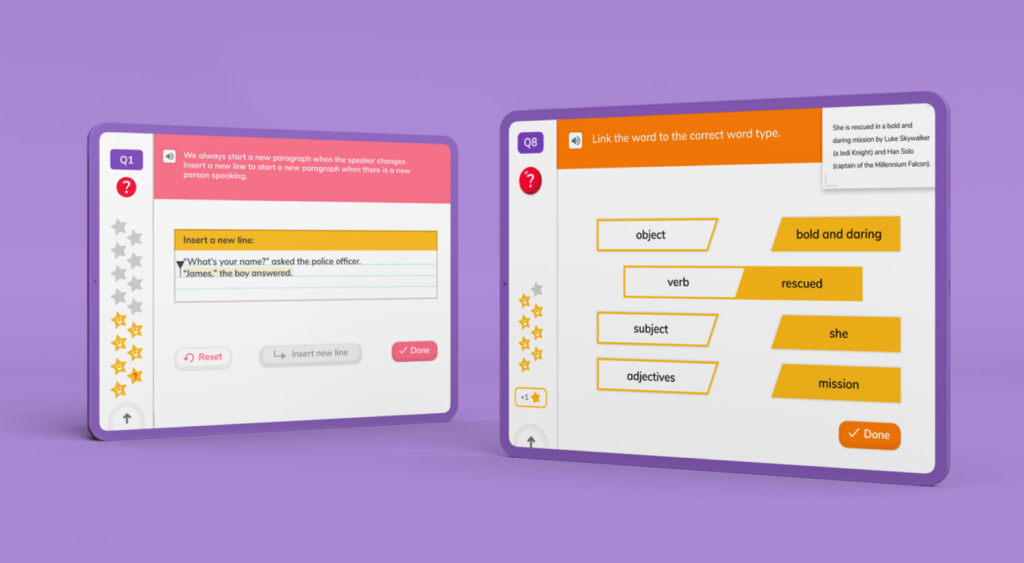

Learn what’s taught in Years 3 and 4 English across the subjects of reading, comprehension, writing, composition, and grammar.

Author
Mhairi Sim
Published
August 2024


Learn what’s taught in Years 3 and 4 English across the subjects of reading, comprehension, writing, composition, and grammar.

Author
Mhairi Sim
Published
August 2024


Learn what’s taught in Years 3 and 4 English across the subjects of reading, comprehension, writing, composition, and grammar.

Author
Mhairi Sim
Published
August 2024


Key takeaways
Table of contents
While there are separate curricular outlines for Year 1 and Year 2 English, targets for Key Stage 2 students are grouped by either upper or lower Key Stage 2 years.
The lower Key Stage 2 programme of study details the curriculum goals that Year 4 and Year 3 national curriculum English students should aim to achieve.
Students who are working through the Year 3 and Year 4 English curriculum will notice a bit of a step up across the entire English curriculum. They’ll be asked to read more challenging texts, learn new reading strategies, and increase the technicality of their writing.
We’ve broken down each area of the curriculum below to take a closer look at what’s covered in each subject. Let’s get started!
In Key Stage 2, reading objectives shift away from word reading to focus primarily on comprehension. While word reading skills are still practised, a larger portion of time is spent developing reading and comprehension skills.
By Years 3 and 4, students should have a firm grasp on decoding, sounding out, and reading unfamiliar words. Their knowledge of root words, prefixes, and suffixes will help with this! In addition, they’re expected to read exception words (words that sound different to how they are spelt).
Reading comprehension becomes an integral part of the English curriculum as students enter Key Stage 2. In lower Key Stage 2, students are building the essential skills they’ll need for Key Stage 2 SATs.
In Year 3 and 4 English students:
Unlock unlimited English questions
Put your skills to the test with fun exercises + learning games that are proven to boost ability!
DoodleEnglish is an app that’s filled with thousands of fun, interactive exercises covering grammar, punctuation, spelling and more!
Designed by teachers, it creates each child a unique work programme tailored to their needs, boosting their confidence and skills in English. Try it for free today!

With the basics now well under their belts, Year 4 and Year 3 English curriculum students will focus on how to compose their written work.
By the lower Key Stage 2, students’ handwriting should be clear and legible with neat joins between letters where appropriate.
They’ll continue to learn new spelling rules as they become more independent in their writing. They are expected to:
Through Key Stage 2, learners will continue to develop their written work by planning and editing what they have written. Following the English national curriculum, students will:
Year 3 and Year 4 learners do a lot of work on writing as they move into the upper Key Stage 2 and secondary school where they’ll be expected to write essays!
Throughout the Year 4 and Year 3 English national curriculum kiddos will also expand their knowledge of vocabulary, grammar and punctuation.
They’ll cover:
There are no mandatory English assessments for Year 3 or Year 4 students. Instead, students are developing the skills needed for Key Stage 2 SATs at the end of Year 6.
There are lots of ways to help your kiddos in Year 3 or 4 English! Exposing them to a variety of reading materials is always a great place to start.
Here are some ideas:
While there are no big tests or assessments in English during Year 3 or Year 4, these are still important years for our learners. The change of pace and step up in difficulty is not to be underestimated.
But fear not – with the right support and encouragement, they’ll do just fine! Try out our tips above to keep their learning on track and ensure they smash all those curriculum goals we’ve outlined in this guide.
Book a chat with our team
If you’d like to use Doodle’s browser version, please visit this page on a desktop.
To log in to Doodle on this device, you can do so through our apps. You can find out how to download them here: